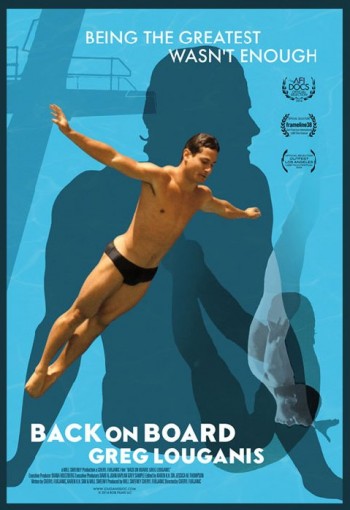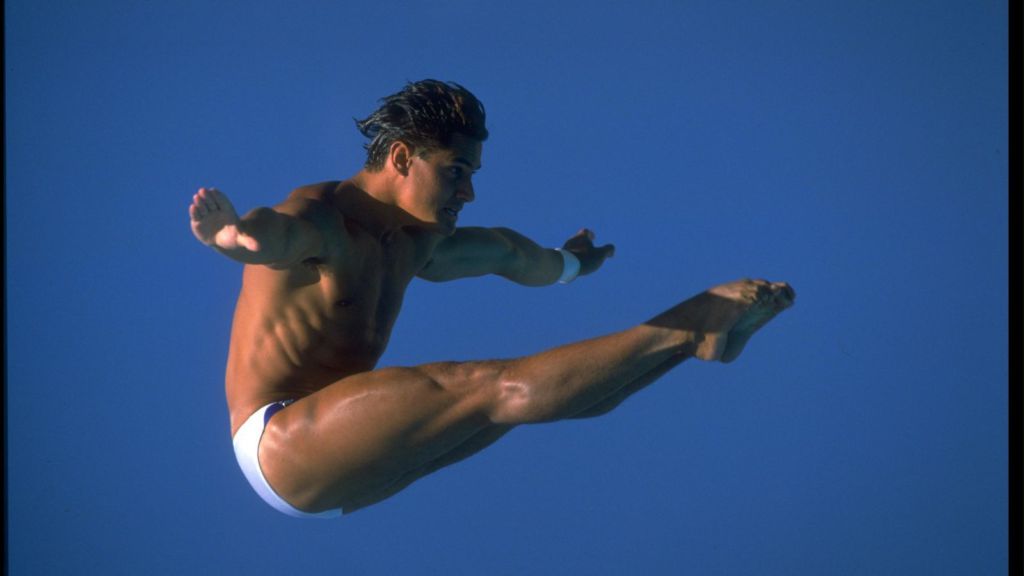 Manuel is working his way through all the LGBT-themed HBO productions.
Manuel is working his way through all the LGBT-themed HBO productions.
Last week we looked at Remembering the Artist: Robert de Niro Sr. which looked at the father of the Oscar winning actor who, in case you didn’t know, was a well-regarded visual artist and a gay man. The doc was (sadly) more interested in the former assertion than the latter, despite sexuality having been central to his art—his most curious muse? Greta Garbo in Anna Christie. This week, we’re taking about another doc portrait though one clearly more centered on its subject’s sexuality.
“Who is Greg Louganis? What kind of question is that?!”
Louganis, still considered the greatest Olympic diver in the history of the sport balks at even having to answer such a question for Cheryl Furjanic in the opening minutes of Back on Board: Greg Louganis. But as he mulls over the question he has to admit he’s not quite sure who Greg is. After all, he retired from diving in 1989, spent much of the 90s coming to terms with himself—he publicly came out ahead of the release of his best-selling memoir, Breaking the Surface (which was later made into a TV movie starring Mario Lopez), disclosing at the same time his HIV-positive status—and finds himself at the start of shooting this HBO Sports documentary fighting with his bank over his mortgage. Yes, Louganis, once a household name synonymous with Olympic glory currently faces the prospect of losing his house and he hopes auctioning off his medals and memorabilia will be enough to keep him afloat. more...
By far the most compelling parts of Back on Board are the moments when Furjanic pushes Louganis to open up about the homophobia he suffered through during his Olympic days. Hearing him talk about being called a “commie fag” by people in his own team, who sophomorically dubbed themselves “The BTF (Beat The Fag) Club,” is a sobering account of how ingrained such teenage taunts were in the culture—and perhaps a reminder that they sound all too familiar for those of us two decades his junior: “I can understand how a person can die of sadness,” he says at one point reminiscing about the bullying he was subject to.
For our purposes here, the film is an astounding document of the rampant homophobia that was hurled at Louganis after he came out, even in situations that prided themselves on touting tolerance. Take the interview with Larry King where the CNN anchor grills Louganis on his HIV status:
“How would a smart guy like you practice unsafe sex?”
It’s the type of question that seems all too benign until you realize the underlying assumptions and cultural prejudices that are being laced within it (only dumb, promiscuous gay men suffer from AIDS). Louganis’ sheer astonishment at having to field the inquiry and his attempt at doing so while keeping his dignity intact is enough to make your heart break. After Louganis strikes back with “I’m not following,” David asks the perfectly innocuous yet loaded question: “How did you get AIDS?”
Louganis is frank about his belated turn towards LGBT activism, and is unafraid about owning up to the many missteps that led him to where he is today which make his story all the more rewarding: here is a story about a sheltered athlete, about a lonely gay man, about an Olympic superstar, who had to all too quickly reinvent himself in order to navigate his life as an HIV positive gay man in the spotlight. The film suggests he’s still a work in progress, making the best of the newfound respect he’s found in the US Olympic diving team (as a mentor), as an LGBT role model (going on CNN to talk with Anderson Cooper about the Sochi Olympics), and as a man struggling to make his mortgage (don’t worry, there’s a happy end there too).
Back on Board: Greg Louganis is most useful as a way to contextualize those figures we may snidely look back on as glass closet cases. Those people the current loud and necessary rhetoric of visibility suggests we shame into the limelight. Both exceptional (an Olympic record-holder who was treated with AZT as soon as he was diagnosed) and ordinary (no multi million dollar endorsements here to even assure him a roof over his head), Louganis’ is a story in a minor key. Neither outright hero nor mourned over victim and definitely not without his own shortcomings, he’s the type of LGBT figure I’d like to see championed more often.


Fun Awards Fact: Furjanic’s documentary was nominated for a PGA award just this past year, in the Sports category (it eventually lost to Real Sports with Bryant Gumbel). And yes, we should probably mention that Lopez was nominated for an ALMA Award for his portrayal of Louganis in the 1997 made-for-TV movie Breaking the Surface: The Greg Louganis Story.
Next Week: Girls may not be the buzzy show it once was, but I’d be remissed if I didn’t spend at least one post talking about my favorite character in that show: Andrew Rannells’ Elijah.
